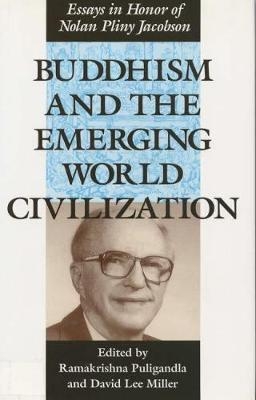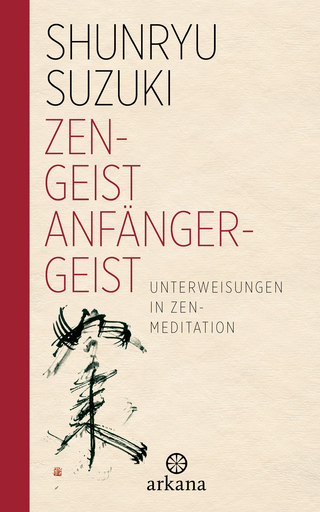
Buddhism and the Emerging World Civilization
Essays in Honor of Nolan Pliny Jacobson
Seiten
1995
Southern Illinois University Press (Verlag)
978-0-8093-1842-1 (ISBN)
Southern Illinois University Press (Verlag)
978-0-8093-1842-1 (ISBN)
- Titel z.Zt. nicht lieferbar
- Versandkostenfrei innerhalb Deutschlands
- Auch auf Rechnung
- Verfügbarkeit in der Filiale vor Ort prüfen
- Artikel merken
This captivating new book, a milestone in Buddhist and comparative studies, is a compilation of seventeen essays celebrating the work and thought of Nolan Pliny Jacobson.
A profoundly motivated interdisciplinary thinker, Jacobson sought to discover, clarify, and synthesize points of similarity among leading thinkers of different Oriental and Western cultures. For almost half a century, he articulated his vision of an emerging world civilization, one in which all people can feel and express their creative, constructive powers for the benefit of others as well as for themselves.
Jacobson believed that philosophy and the works of philosophers should be understood as a vital force enriching all civilizational experience. His own philosophic perspective was rooted in the conviction that novelty is the source of all experience and the center of a creativity that lives beyond words, arguments, and rational paradigms. Throughout his career, Jacobson explored Buddhist texts and personalities, spending much time in the Orient, particularly Myanmar and Japan. He also closely studied the works of numerous Western philosophers, including Whitehead, Dewey, Peirce, James, Hartshorne, and Wieman. Jacobson believed that American philosophy and Buddhism concurred in many ways, with the potential to form a powerful basis for the development of a world civilization.
The essays in this volume are organized around Jacobson s activities, publications, and interests. Authored by an impressive selection of scholars, the essays are grouped into four sections"Historical Context," "Central Issues," "Practical Implications," and "The Japan Emphasis." Hajime Nakamura, Charles Hartshorne, Kenneth K. Inada, Seizo Oho, and numerous others discuss freedom, creativity, and Buddhism s self-corrective nature, setting forth their reasons for sharing Jacobson s ideas and visions."
A profoundly motivated interdisciplinary thinker, Jacobson sought to discover, clarify, and synthesize points of similarity among leading thinkers of different Oriental and Western cultures. For almost half a century, he articulated his vision of an emerging world civilization, one in which all people can feel and express their creative, constructive powers for the benefit of others as well as for themselves.
Jacobson believed that philosophy and the works of philosophers should be understood as a vital force enriching all civilizational experience. His own philosophic perspective was rooted in the conviction that novelty is the source of all experience and the center of a creativity that lives beyond words, arguments, and rational paradigms. Throughout his career, Jacobson explored Buddhist texts and personalities, spending much time in the Orient, particularly Myanmar and Japan. He also closely studied the works of numerous Western philosophers, including Whitehead, Dewey, Peirce, James, Hartshorne, and Wieman. Jacobson believed that American philosophy and Buddhism concurred in many ways, with the potential to form a powerful basis for the development of a world civilization.
The essays in this volume are organized around Jacobson s activities, publications, and interests. Authored by an impressive selection of scholars, the essays are grouped into four sections"Historical Context," "Central Issues," "Practical Implications," and "The Japan Emphasis." Hajime Nakamura, Charles Hartshorne, Kenneth K. Inada, Seizo Oho, and numerous others discuss freedom, creativity, and Buddhism s self-corrective nature, setting forth their reasons for sharing Jacobson s ideas and visions."
Ramakrishna Puligandla is a professor of philosophy at the University of Toledo.Among his published works are Fact and Fiction in B. F. Skinner’s Science and Utopia, An Examination of the Copenhagen Interpretation of Quantum Theory, Fundamentals of Indian Philosophy, An Encounter with Awareness, and Jñana Yoga. David Lee Miller is professor and chair of the Department of Philosophy at the University of Wisconsin—La Crosse. He is the author of Philosophy of Creativity and numerous essays investigating the nature of creativity.
| Erscheint lt. Verlag | 31.12.1995 |
|---|---|
| Zusatzinfo | 1 |
| Verlagsort | Carbondale |
| Sprache | englisch |
| Maße | 140 x 216 mm |
| Themenwelt | Geisteswissenschaften ► Religion / Theologie ► Buddhismus |
| ISBN-10 | 0-8093-1842-3 / 0809318423 |
| ISBN-13 | 978-0-8093-1842-1 / 9780809318421 |
| Zustand | Neuware |
| Haben Sie eine Frage zum Produkt? |
Mehr entdecken
aus dem Bereich
aus dem Bereich
Philosophische Betrachtungen
Buch | Softcover (2024)
Aufbau TB (Verlag)
12,00 €
Unterweisungen in Zen-Meditation
Buch | Hardcover (2024)
Arkana (Verlag)
20,00 €


